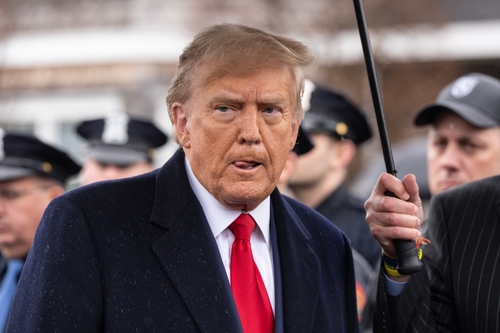A New York state appeals court has denied former President Donald Trump's appeal to lift the gag order imposed on him during his ongoing hush money criminal trial. The court's decision has stirred significant reactions, particularly among Trump supporters who view the gag order as a violation of his First Amendment rights.
The gag order, initially imposed by Judge Juan Merchan, restricts Trump from making public comments about witnesses, jurors, court staff, and prosecutors involved in the case. The order was later expanded to include family members of the involved parties after Trump publicly criticized the judge's daughter for her professional affiliations.
BREAKING
New York’s highest court has declined to hear Donald Trump’s appeal on the gag order in his hush-money case. pic.twitter.com/70z4Vr2FwX
— Republicans against Trump (@RpsAgainstTrump) June 18, 2024
Trump's legal team argued that the gag order infringes upon his right to free speech. However, the appellate court upheld the order, stating that Trump's public statements posed a "significant threat to the integrity of the testimony of witnesses and potential witnesses." The court emphasized that while litigants do not surrender their First Amendment rights entirely in a courtroom setting, these rights must be balanced against the need to ensure the fair administration of justice.
Throughout the trial, Trump has been fined multiple times for violating the gag order. In one instance, he was fined $9,000 for a series of statements attacking witnesses Michael Cohen and Stormy Daniels. Judge Merchan has warned Trump that continued violations could result in more severe penalties, including potential jail time, although he stressed that such measures would be a last resort.
🚨Breaking: New York Court Denies President Trump's Gag Order Appeal. Trump Still Gagged After Jury Returns Guilty Verdict in Hush Money Trial.
This all has to go to the Supreme Court. pic.twitter.com/ujTnUrNQgP
— ᗩℓιѕѕα♡ (@Alissa4TheUSA) June 18, 2024
The court's decision has not deterred Trump from continuing his public defense. He has repeatedly expressed his frustrations with the gag order, stating that it hampers his ability to respond to allegations and defend himself publicly. "You ask me questions, I’m not allowed to respond. The gag order has to come off," Trump told reporters recently.
Trump's supporters argue that the gag order is politically motivated, aimed at silencing him ahead of the 2024 presidential election where he is a leading Republican candidate. They see the order as part of a broader effort to undermine his campaign and limit his ability to communicate with voters.
Despite the restrictions, Trump has continued to criticize the judicial system and the prosecutorial process, framing the case as a politically driven "witch hunt." He has maintained his innocence on all charges, which include 34 counts of falsifying business records related to alleged hush money payments to Stormy Daniels during the 2016 election.
The appeals court ruling marks a significant moment in Trump's legal battles, highlighting the ongoing tensions between his legal defense strategies and the judiciary's efforts to maintain order and integrity in the trial. As the trial progresses, the enforcement of the gag order and Trump's compliance will remain critical focal points.

